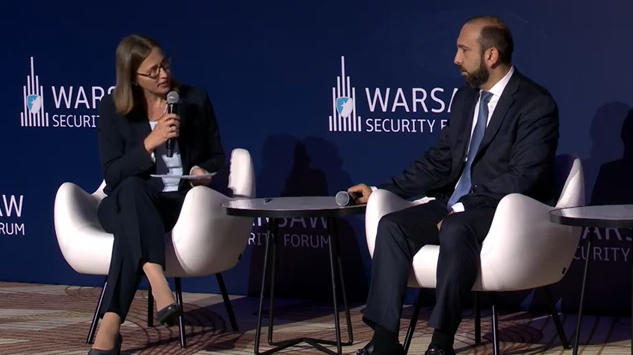On October 2, 2024, at the Warsaw Security Forum, Armenian Foreign Minister Ararat Mirzoyan was interviewed by Anja Wehler-Schöck of Tagesspiegel. Mirzoyan responded to many questions, some of which have already been noted and criticized in the Azerbaijani press. Mirzoyan’s statements bring two items to light: zero-sum false dichotomy and dogmatic phraseology, becoming evident just before the four-minute mark in the interview
A zero-sum false dichotomy arises when a situation is perceived as a zero-sum game, where one party’s gain is assumed to come at the expense of another party’s loss. This bias creates a false dichotomy, presenting only two extreme options as exhaustive and mutually exclusive while ignoring the possibility of mutually beneficial or neutral outcomes. This combines the errors of both biases, leading to an oversimplified and inaccurate representation of the situation.
Mirzoyan was articulate in stating that Armenia is moving away from having Russia as its primary security provider, via the CSTO or unilaterally, because Russia/CSTO (1) didn’t come to the aid of Armenia (or Armenians) during Azerbaijan’s 2020 conquest of Nagorno-Karabakh, (2) it’s peacekeepers in Nagorno-Karabakh were ineffective in the aftermath of the 2020 conflict, and (3) by 2022, the Azerbaijani military has occupied over two hundred square kilometers of international recognized Armenian territory. While these three items are accurate, Mirzoyan never addressed why Russia and the CSTO reacted in such a manner in this forum or any other. Furthermore, Mirzoyan’s solution for this is for Armenia to turn to the EU, claiming the Armenian people demand a move away from Russia since Armenia is a democracy, and this represents the will of the Armenian people.
Early in the interview, Mirzoyan wittingly stated the word democracy almost ten times, as a metaphor for non-Russian-centric. This reminds one of the Soviet era, where the word socialism was used in political contexts as a metaphor to contrast the USSR with the West. Mirzoyan attempted to impress his EU audience while demonstrating the legitimacy of his government because it was elected in a democratic process. Azerbaijan has the same election mechanics, but it is an effective dictatorship.
Mirzoyan and the government he represents equate EU membership with military security, yet hesitated when asked why Armenia doesn’t leave the CSTO. One must have something to offer to join any alliance, be it economic or military. What is Armenia offering? The European Union is not a military security structure but evolved from the European Economic Union. Taken to its extreme, many EU states provide weapons, training, and covert ground support for Ukraine against Russia. Yet it is Ukraine that has lost at least half a million soldiers. It now has a population of about two-thirds of what it was before 2022. Is this the option that Mirzoyan favors? If so, where are the full arguments for leaving the CSTO?
Conversely, where are the arguments that would result in Armenia’s enhanced cooperation with the CSTO? The Republic of Georgia rejected the US/EU’s demands to open a second front against Russia after the beginning of the Russian SMO in Ukraine. The first Georgian attempt to open a front against Russia was the 2008 Russian-Georgian war, and the West left Saakashvilli hanging with a loss of territory.
Mirzoyan’s zero-sum foreign policy direction — something vaguely Western-centric at the expense of Russian-centric — is a false dichotomy because it precludes all other options. Even this assumes the binary options are of equivalent form, which they are not. One option it precludes is Armenia not depending on others. Moving away from dependency necessitates defining interests and setting strategic goals, not blindly stating that Armenians view themselves as European, as did Mirzoyan. The most challenging task in securing a goal of at least a base level of self-sufficiency is to change a nation’s strategic culture. Strategic culture refers to a nation’s traditions, values, attitudes, patterns of behavior, habits, symbols, achievements, and particular ways of adapting to the environment and solving problems concerning the threat or use of force.
Regional and international strategic environments are characterized by varying degrees of chaotic behavior, complexity, and volatile, uncertain, and ambiguous external and internal components. It includes rational and irrational choices, chance, probability, competitors, allies, and other actors. It is not us-against-them, zero-sum, or blindly adopting one side in a false dichotomy.
Yerevan, Armenia
Author: David Davidian – Lecturer at the American University of Armenia. He has spent over a decade in technical intelligence analysis at major high technology firms. He resides in Yerevan, Armenia



